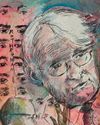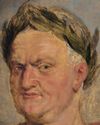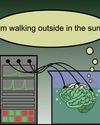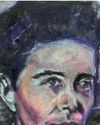Metaphors & Creativity

The equivalence between Richard Feynman’s and Julian Schwinger’s distinct formulations of quantum electrodynamics was by no means obvious. The two physicists themselves saw their methods as competing instead of being complementary. However, after becoming familiar with both approaches, Freeman Dyson had a ‘flash of illumination’ about how to reconcile them, while travelling home in a Greyhound bus. Thus it came to pass that Dyson secured yet another place for himself in the history of physics. And in his book The Emperor’s New Mind (1989), Roger Penrose recounts Henri Poincaré’s narrative of the moment when his search for ‘Fuchsian functions’ came to completion while in the middle of a geological expedition. It turned out, exclaimed Poincaré, that “the transformations I had used to define the Fuchsian functions were identical with those of non-Euclidean geometry.” The answer was ‘staring at him in the face all along’, as they say.
Such ‘flash of inspiration’ narratives, in which a coveted creative breakthrough almost violently irrupts into the mind of an ecstatic subject, surely are the archetypal depiction of creativity. This archetype suggests, not particularly subtly, that creative insight is a phenomenon that happens to the subject, not something the subject deliberately produces. Framed in this way, the mystery surrounding creativity becomes, who or what plays the active role in it?
Hypotheses about what lies at the onset of creativity abound. Sometimes people report that ideas ‘come down’ to them, even when they’re not conscious. An example of this is the story told by the German physicist August Kekulé, who claimed to have envisioned the hexagonal structure of the benzene molecule while he was sleeping. In his dream, dancing atoms formed a closed string that subsequently transmuted into a snake eating its own tail.
This story is from the {{IssueName}} edition of {{MagazineName}}.
Start your 7-day Magzter GOLD free trial to access thousands of curated premium stories, and 9,500+ magazines and newspapers.
Already a subscriber ? Sign In
This story is from the {{IssueName}} edition of {{MagazineName}}.
Start your 7-day Magzter GOLD free trial to access thousands of curated premium stories, and 9,500+ magazines and newspapers.
Already a subscriber? Sign In

Affirmative Action for Androids
Jimmy Alfonso Licon asks, when should we prioritise android rights?

Welcome to the Civilization of the Liar's Paradox
Slavoj Žižek uncovers political paradoxes of lying.

The Importance of the Purple
Massimo Pigliucci looks for threads of integrity in a morally compromised world.

Ethics for the Age of AI
Mahmoud Khatami asks, can machines make good moral decisions?

Anand Vaidya (1976-2024)
Manjula Menon on the short but full career of a 'disciplinary trespasser'.

Studying Smarter with AI?
Max Gottschlich on sense and nonsense when using AI in academia.

Excusing God
Raymond Tallis highlights the problem of evil.

Stephen Fry
Perhaps unshockingly for someone who is an actor, broadcaster, comedian, director, narrator and writer, Stephen Fry has a deep interest in words and how we use them. After hearing him lecture on that subject, Marcel Steinbauer-Lewis asked him about Artificial Intelligence and how it connects with the extraordinary lure of language.

Is VR Meaningful Escapism?
Amir Haj-Bolouri enquires into possible meaning through technology.

What Simone de Beauvoir Got — And Didn't Get – About Motherhood
Nura Hossainzadeh argues that motherhood is both physical and transcendent.
